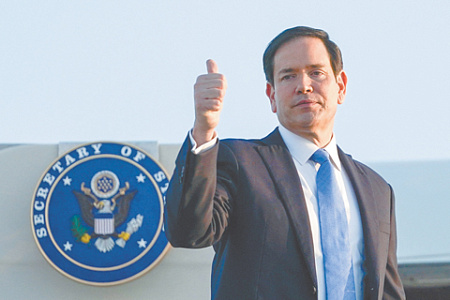
In a dramatic policy shift seemingly designed to counter accusations of being soft on Russia, President Donald Trump’s administration is signaling a new, hardline stance on Moscow. The pivot was showcased during the UN General Assembly, where both the president and his Secretary of State, Marco Rubio, made a series of uncharacteristically sharp statements directed at the Kremlin.
The G7 foreign ministers, meeting on the sidelines of the assembly, laid the groundwork for this tougher approach. While their final communiqué, presented by Italian Foreign Minister Antonio Tajani, did not announce new sanctions, it unequivocally condemned Russia’s actions against Ukraine. The statement affirmed that the seven nations remain committed to inflicting economic costs on Moscow, “building on the comprehensive package of sanctions and economic measures.” This marks the first time under President Trump that the United States has formally joined the G7 in reaffirming such a united front, suggesting a significant change in Washington’s Russia-Ukraine policy.
This sentiment was echoed by Secretary Rubio at the UN Security Council, who warned that while President Trump has shown “extraordinary patience” with Russia, it “is not limitless.” He stated that a moment would come when Washington concludes Moscow is not interested in peace, at which point the president “will have real options before him that he will use.” Rubio’s speech alluded to the possibility of both new sanctions and increased arms shipments to Kyiv, building upon the weapons supplies that have already commenced under Trump’s tenure, albeit through a different mechanism than his predecessor.
President Trump himself made this policy change explicit. In a notable exchange, he answered affirmatively when a journalist asked if Russian planes violating NATO airspace should be shot down. Following a meeting with Ukrainian President Volodymyr Zelenskyy, which the Ukrainian leader described positively, Trump pledged to persuade Hungary to end its reliance on Russian oil and declared that the “Russian economy is in terrible shape, it’s collapsing.” This is a stark reversal from his past rhetoric, where he once bluntly told the Ukrainian president, “you don’t have the cards.”
Perhaps the most stunning declaration came via a post on Trump’s Truth Social platform. Labeling Russia a “paper tiger,” the president wrote that “Ukraine, with the support of the European Union, is in a position to fight and RETAKE all of Ukraine” and, provocatively, “who knows, maybe even go further.” This statement single-handedly overturns previous assurances from his own administration officials, who had publicly deemed Ukraine’s return to its 1991 borders impossible and had dismissed its prospects for NATO membership.
The Kremlin, however, is not interpreting these statements as a definitive end to dialogue. Russian presidential spokesperson Dmitry Peskov noted that Moscow would still work to convey its position to the U.S. president. Peskov appealed to the Trump administration’s “business-oriented” nature, suggesting it “cannot fail to understand the benefits that lie in this potential bilateral trade and economic cooperation,” a long-standing Russian argument to broaden the U.S.-Russia relationship beyond the conflict in Ukraine.
For all the fiery rhetoric, President Trump has yet to unleash the “devastating sanctions” or a massive surge in arms a he has previously teased. Instead, in a familiar pattern, he has set a new deadline—this time one month—to determine his definitive policy toward the Kremlin, leaving allies and adversaries alike waiting to see if these powerful words will finally translate into decisive action.
